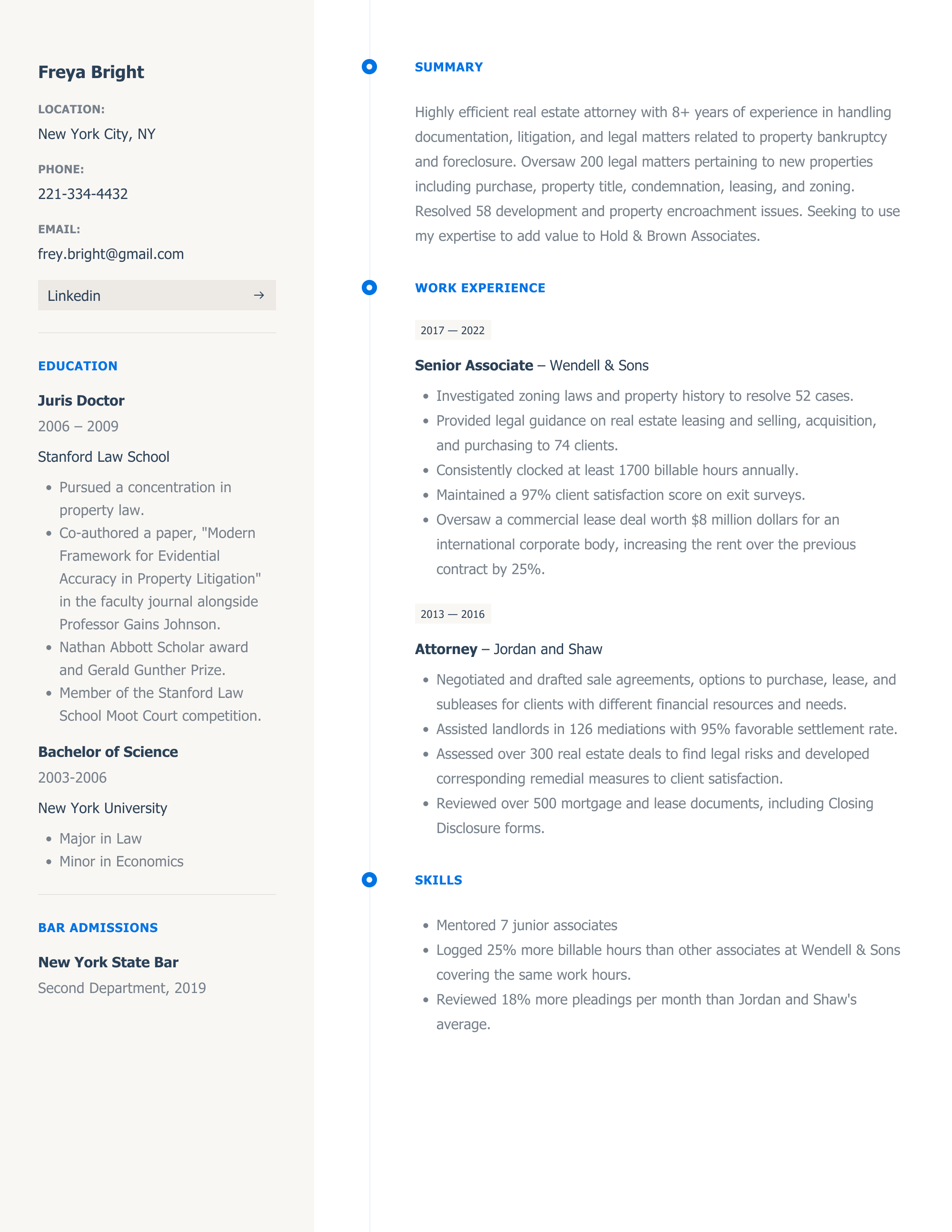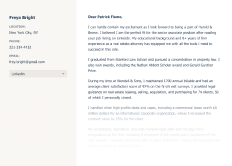Imagine losing a case or getting your motion thrown out due to a technical error. That feeling is a lot
worse when your job application is tossed out because you used the wrong resume format or failed to
proofread.
That's because
writing a great
resume
is easier than filing a patent or putting a motion together.
However, preparing a job-winning resume could be as important as winning a lawsuit. Your next job could
be the milestone that sets you on your career path.
There are many other reasons why writing a great resume is important.
Those reasons are also why you should take this article seriously. That’s because you’ll find the best
tips on writing a great lawyer resume, including lawyer resume examples, in this post.
How Much Do Lawyers Earn?
According to the
money.usnews.com
, lawyers had a median annual wage of $
126,930
in 2020.
Your resume format guides the recruiter
to different sections and information. Using the right format means they’ll find what they’re looking
for in those 7 seconds and continue reading your application. On the other hand, they’ll move on if your
resume is poorly formatted.
There are three different types of resumes that you can use. They include:
- The Chronological Resume Format
- The Functional Resume Format
- The Combination Resume Format
The chronological resume format places more emphasis on your work experience. It lists your career
history in a chronological order. That means you’ll start with your most recent job and end with your
earliest. It’s one of the most common resumes to use and arguably the best.
The functional resume focuses on your skills and it’s ideal for fresh graduates or lawyers with
significant employment gaps. It’s less common among professionals, but it does have its uses. Using this
resume, you’ll be talking more about your skills, with less focus on your experience.
The combination resume is considered a hybrid resume because it combines the best parts of the
chronological and functional resume formats. It’s ideal for professionals with lots of skills and work
experience to showcase when bidding for high-level positions. It’s also the go-to resume for people
switching fields.
Which Format Should You Use?
The best format to use, hands down, is the chronological resume format. Apart from being the right choice
for professionals who have plenty of experience and achievements, hiring managers are used to the layout
and scan resumes with the format in mind.
So, using the format would be a great idea as you want the hiring manager to see your work experience
where they expect it to be.
That said, there are situations that call for using other formats.
For example, managers looking to hire interns or entry level associate attorneys may want to go through
their skills rather than their experience. That’s because they expect to fill these positions with fresh
graduates.
So, putting your skills at the top of the resume right after your career objective would be the right
move in this case.
Also, the combination resume would be the right choice in specific situations. If the job listing
requires specific skills and a level of experience, you have to emphasize your experience and
skills.
So, look at the wording in the job description to determine which resume format to choose.
Lawyer Resume Example
Steps to Writing a Job-Winning Lawyer Resume: The Best Lawyer Resume Template
Picking the layout of your resume is the first important step, but what follows is just as crucial.
From writing out your resume header and a powerful professional summary, to listing out your skills and
qualifications, you have to arrange the rest of the document in a way that gets the recruiter's
attention.
But before you start with the header, there are few things you should take note of:
- Pick a great font: Ideally, your font size and type should be clean and legible. The best size falls within 10 to 12,
and the font types to use include Arial, Calibri, Verdana, Cambria, Bookman Old Style, and Georgia.
- Use Proper Line Spacing: Double line spacing after subheadings (1.15) or single line spacing are the standard.
- Use Adequate White Space: White spaces make your resume scannable and easy to read. Packing everything closely together can
confuse the recruiter.
Now, let's walk you through writing your legal resume the right way.
The resume header includes your name, profession, contact information, and professional summary.
Your name should be the boldest part of the resume and your professional title should be right beneath
it.
Your first name should come before your last name, and make sure you use the same name you use across all
your legal documents and social media profiles.
Right after your name and your title goes your contact information. The contact information contains the
following:
- Location
- Phone number
- Email address
- Website/portfolio
- Professional social media profiles
Here are some critical tips that should guide how you write your contact information:
- There's no need to write out your full mailing address unless the recruiter instructs you to do so.
The name of your city or state will be enough.
- Your email address should contain your first and last names. Avoid using an email address with
numbers or nicknames.
- You can use your personal or business email, but don't use your current work email.
- You can add a second phone number but ensure the first one is always reachable.
- Add your LinkedIn profile. You can also add your Twitter profile if it's professional.
Freya Bright, Lawyer
frey.bright@gmail.com
New York City, NY
Your Professional Summary
Your professional summary acts as your
official introduction. It summarizes your entire resume and professional career just as its name
suggests.
It should tell the recruiter everything about your professional life in a few, short sentences.
Make sure you point out your best qualities and experiences relevant to the job you're applying for. That
way, the recruiter will find what they're looking for at the top of the resume, then proceed to read
further.
The professional resume summary is ideal for lawyers with years of experience and rich work histories. It
showcases your previous achievements at a glance, rounding up with a statement that shows your desire to
work for the firm.
If you're fresh out of school, however, you should use a resume objective instead. It focuses on your
enthusiasm and motivation to perform at the highest level.
Even if you're a fresh graduate applying for a junior or entry level role, merely writing about your
courses and dedication to work won't be quite enough. You can stand out by adding small experiences
you've gathered over the years.
First Example: Lawyer with Experience
Highly efficient real estate attorney with 5+ years of experience in handling documentation, litigation,
and legal matters related to property bankruptcy and foreclosure. Oversaw 200 legal matters pertaining
to new properties including purchase, property title, condemnation, leasing, and zoning. Resolved 58
development and property encroachment issues. Seeking to use my expertise to add value to Hold & Brown
Associates.
Second Example: Lawyer with Less Experience
Dedicated real estate attorney seeking to log a consistent high rate of annual billable hours for Hold &
Brown Associates as a junior attorney. Able to oversee legal property matters, having reviewed lease
contracts for local landlords and settled 5 cases favorably. Judged 4 high school moot court contests
and clerked for Judge John Waters of the New York City Housing Court.
Note: It would be a good idea to write your professional summary after you complete your resume. This
way, you can pick out important bits from the resume to add to the summary.
The Experience Section
When it comes to any legal profession, experience
matters a lot. In many job openings, it makes the difference.
The hiring manager wants to know where you've worked, what role you've handled, and if they're relevant
to the open position they want to fill.
So, your top priority when preparing your experience section is to use the job description as a
guide.
Sure, you've gained lots of experiences in the past. But how many of them are similar to the job you want
to land?
Since you're using a one-page long document, you have to streamline your experience section to those past
roles.
But it doesn't end at showing the recruiter you have relevant experience. They also want to know you have
relevant capacity.
After all, merely saying you worked at a particular company doesn't show you excelled at the role.
So, you have to list your achievements in every role you've handled. Use numbers and metrics to back up
your claim to make them look legitimate.
Each role should contain:
- The name of the company
- Your job title
- Number of years at the company
Since you're using a chronological format, start from your latest role to the earliest. Under each role,
list your responsibilities and achievements with 5 to 6 bullet points, reducing the number of bullets as
you descend.
Here's an example.
Senior Associate
Wendell & Sons
2016 - 2022
- Investigated zoning laws and property history to resolve 52 cases.
- Provided legal guidance on real estate leasing and selling, acquisition, and purchasing to 74
clients.
- Consistently clocked at least 1700 billable hours annually.
- Maintained a 97% client satisfaction score on exit surveys.
- Oversaw a commercial lease deal worth $8 million dollars for an international corporate body,
increasing the rent over the previous contract by 25%.
2013 - 2016
- Negotiated and drafted sale agreements, options to purchase, lease, and subleases for clients with
different financial resources and needs.
- Assisted landlords in 126 mediations with 95% favorable settlement rate.
- Assessed over 300 real estate deals to find legal risks and developed corresponding remedial
measures to client satisfaction.
- Reviewed over 500 mortgage and lease documents, including Closing Disclosure forms.
How to Write the Experience Section for a Fresh Graduate
That said, you may still lose out on the best employment opportunity if you don't arrange your experience
section right as a law school graduate.
So, before heading out for that dream job, consider filling up your resume with experiences such as
judicial clerkship, pro bono work, volunteering at courts, and presiding over moot court competitions in
high schools.
Your experience section can look like this:
Judicial Law Clerk to New York City Housing Court Judge
- Researched personal and real property tax issues.
- Researched, reviewed, and analyzed submitted documentary evidence in property tax assessment
disputes.
- Drafted and reviewed judicial opinions.
- Researched and analyzed local, state, and federal property statutes.
- Drafted and reviewed orders in response to motions brought before the Housing Court judge.
Attorney Experience
- Performed bi-monthly pro bono trial research for the New York City Housing Court.
- Conducted legal research that led to favorable settlements.
- Judged Townsend Harris High Moot Court competition, writing 8 decisions and determining the winners
satisfactorily.
Make sure you add other juicy achievements that you believe would be relevant to the job
description. Use numbers, metrics, and scores if you have them.
Add Your Bar Admissions
Of course the recruiter will want to know that
you're licensed to practice law where they operate, especially if you’ll be providing legal
representation.
So, you have to list your bar admission on the resume. You can add it before or right after your
experience section. However, whatever you do, ensure the recruiter can easily find your license
status.
You can add it this way:
Bar Admissions
New York State Bar, Second Department, 2019
Avoid using the “Bar association” label to indicate your license. That’s because the bar associations in
some states are private organizations, and membership to those bodies doesn't mean membership to the
state bar.
How to Write Your Law Education Section
While your experience section
remains the most critical part of your legal resume, you still have to provide your educational
qualifications.
The education section is your opportunity to show off your ivy league school degree, which gives you a
significant edge.
But it doesn't mean you have to skip the section if you attended a Tier 4 school or community
college.
Your degree can still make an impact on your resume regardless of your alma mater. But it depends on how
you write your education section.
So what should you do? Here are tips you should follow:
- Include the name of your college and its location.
- Write out your years in school.
- Indicate your degree.
- Add your bachelor's degree if you have a Juris Doctor.
- List your publications, relevant coursework, and achievements as a student.
Juris Doctor
New York University 2006-2009
- Pursued a concentration in property law.
- Co-authored a paper, "Modern Framework for Evidential Accuracy in Property Litigation." in the
faculty journal alongside Professor Gains Johnson.
- Member of the NYU Law School Moot Court competition.
Bachelor of Science
New York University, 2003-2006
- Major in Law
- Minor in Economics
You don't have to add your GPA unless you bagged something higher than 3.5.
Preparing Your Skills Section
Listing your skills in your resume has gone
beyond telling the recruiters you have the skills listed on their job description.
Instead, you can take things a bit further by stating how you used your skills in your previous
positions. This way, the recruiter will not only believe that you possess those skills, but also know
how you use them.
For example, if a job posting lists leadership, time management, and reviewing pleadings as part of the
required skills, your skills section could look like this:
Skills
- Mentored 7 junior associates.
- Logged 25% more billable hours than other associates at Wendell & Sons covering the same work
hours.
- Reviewed 18% more pleadings per month than Jordan and Shaw's average.
Even if you're a junior lawyer with less experience, you can list how you used your skills when you
conducted pro bono work or in your capacity as a judicial clerk.
You can further level up your resume
and flaunt your professional sophistication by adding extra sections. These sections will show the
recruiter how deep you’ve gone into the legal profession and catch their attention.
Extra sections may include:
- Publications on law journals
- Volunteer work
- Awards and Honors
- Conferences
- Professional organizations
Main Takeaways
That’s how to write a resume that helps you lock down
interviews. Remember to always streamline your resume to each job description and company. Use
achievements to show the recruiter you’re right for the job. And use white space, the right font, and
the right format to make your resume scannable.
You can also attach a
cover letter
to your application to further introduce yourself to the recruiter and create the right first
impression.
Lawyer cover letter
An ideal resume is a combination of content that would allow you to stand out and format that is
ATS-friendly, neat and comfortable to read. Learn more about writing the perfect resume here, and be sure to
check out expert tips on creating an effective Lawyer cover letter to go with your resume.
Go to cover letter
Alex Miller is a writer, editor, and HR manager who specializes in education and counseling. He was born in Slovenia and moved to the USA as a teen. Alex loves to travel and explore old towns. He is passionate about psychology, literature, and good food.



